Achieving Excellence
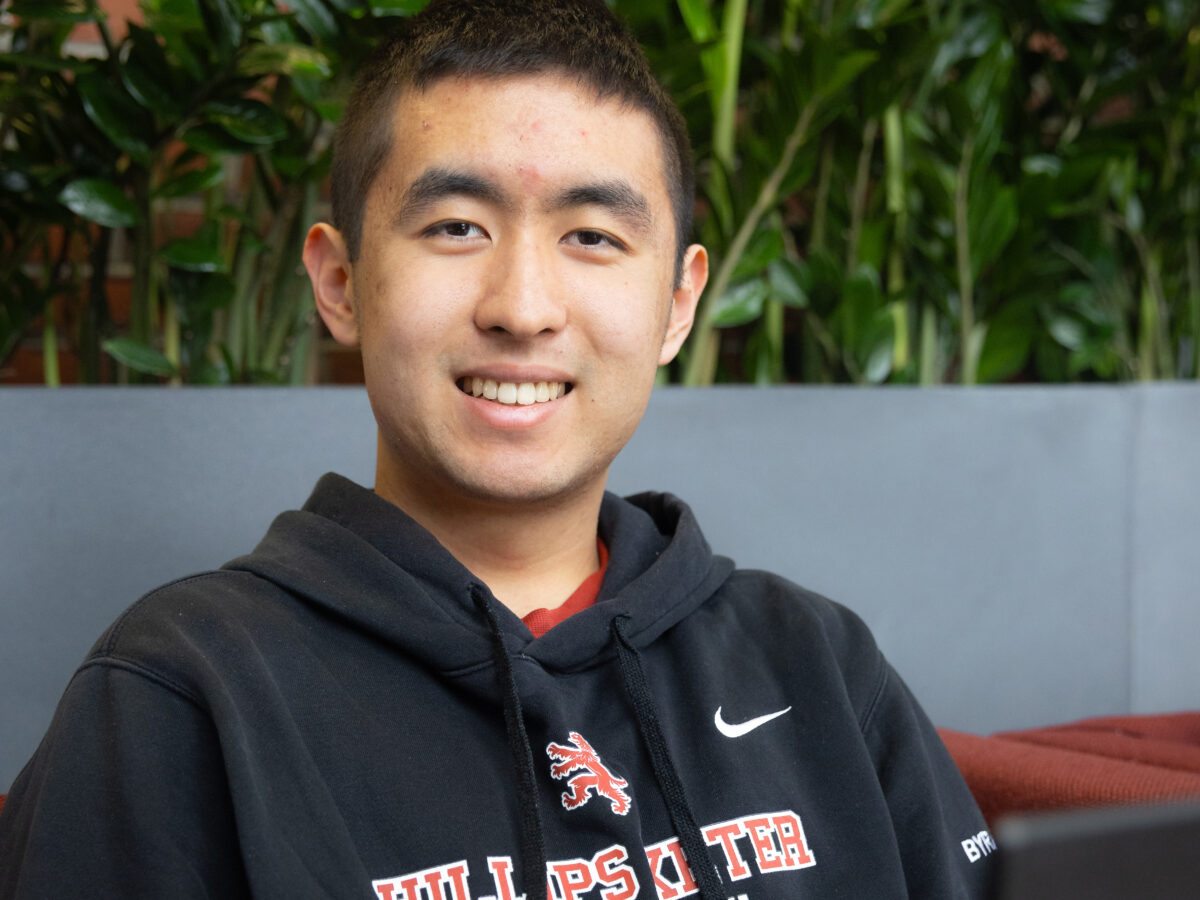
Curiosity and hard work earn students accolades in computer science, math, music and more
Computer Science
Senior Builds Laptop From Scratch
What started as “betcha can’t” on a team bus trip to a squash match turned into a yearlong passion project for Byran Huang ’25. After accepting a teammate’s challenge to build a computer from scratch, he says he spent “a couple thousand” hours meticulously planning, building and testing nearly every element of his custom open-source laptop. Huang calls it anyon_e.
“I thought about all the projects I’d done in the past — building circuit boards, power systems and data systems,” he says. “This felt like a capstone to all that, a magnum opus.”
Huang parlayed his pursuit into a sanctioned senior project, receiving support from the Academy. He worked extensively in the Design Lab in the Phelps Science Center and spread his materials in the back of Steyer Distinguished Professor Brad Robinson’s physics classroom. “I received amazing funding,” Huang adds. “I blew my budget two and a half times over and nobody batted an eye. The school was constantly there to support me.”
It was important to Huang not only that his laptop be fully functional, but also that his process was easy for others to replicate. “This is a time when technology is innovating so fast, but people don’t get access to how to create things openly,” he says. “I wanted to go on this journey to publish everything I had made for the world to share.”
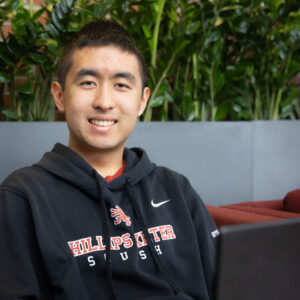
Huang produced a YouTube video, “How I Made a Laptop From Scratch – anyon_e,” detailing every step of his building process. Among the more than 1 million views was a Neuralink engineering lead who recruited Huang to intern with the Robot Surgery Electrical Engineering team this summer.
Like any good scientist, Huang is taking what he learned from this experience and hoping to refine the process. “I’m really looking forward to building a second version of this laptop that’s affordable,” he says. “Something you can build in your house from scratch.”
Huang is quick to credit the Academy as an inspiration, saying, “Exeter has always been this place that I’ve felt has magical powers to push you to discover more you didn’t know you were capable of doing.”
Civics
Debater Heads to Global Championship
For the third consecutive year, an Exonian competed on the global debate stage. Andrew Gould ’26 headed to Kuala Lumpur, Malaysia, in late March for the World Individual Debating and Public Speaking Championship.
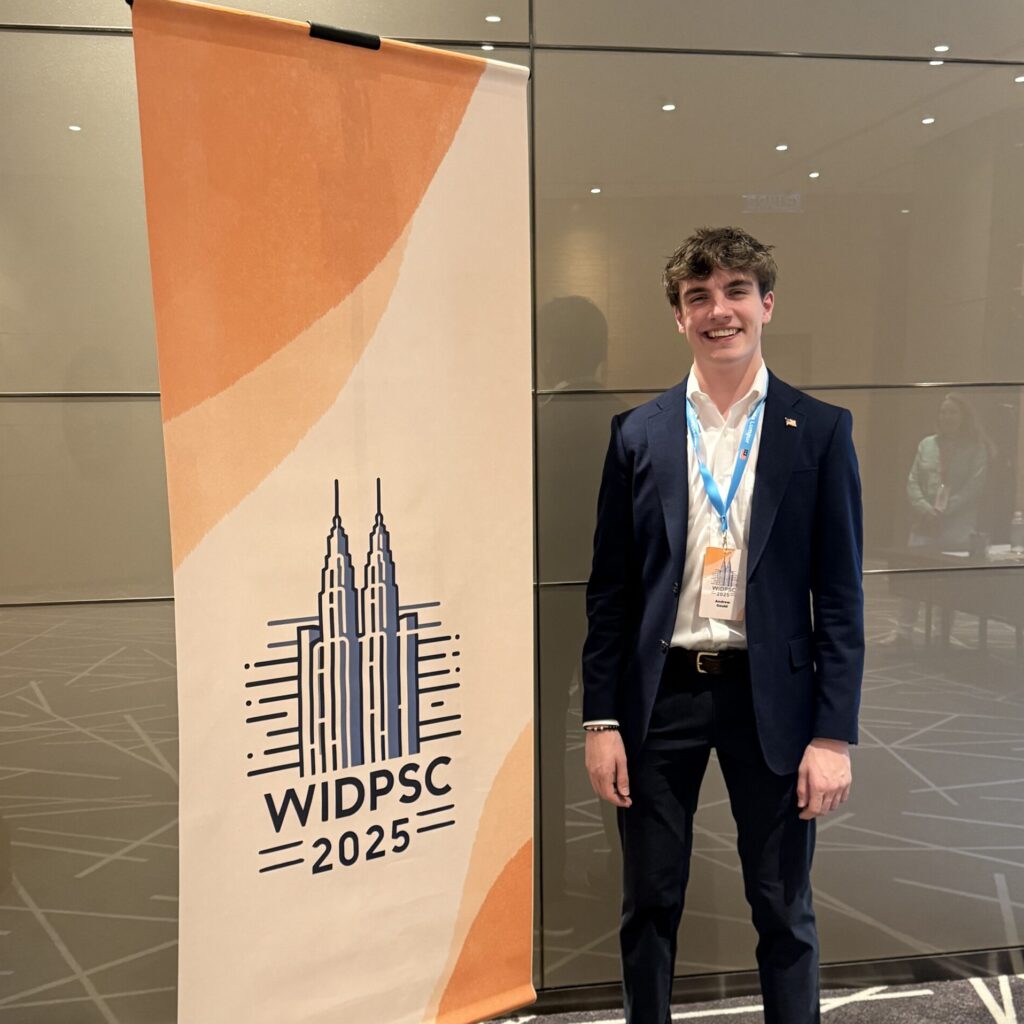
Co-head of the Academy’s Daniel Webster Debate Society, Gould qualified for the international tournament through his stellar performance at various debate events throughout the school year, including a first-place duo team finish alongside Jinmin Lee ’26 at St. Paul’s School, where they debated a resolution stating that the United States should increase its military presence abroad. “We ran a counterplan to throw off our opponents,” Gould says. “As the opposition, we argued that the U.S. should increase its military presence to uphold global prestige, especially in the face of revisionist states like Russia or China. We also argued that if countries currently reliant on U.S. military and nuclear protection were to be abandoned by the U.S., they would develop their own defenses, and even potentially their own nuclear arsenal. Those aren’t necessarily our personal views, but researching and building that counterplan was incredibly eye-opening. It gave me a deeper appreciation for the delicate balancing act that is foreign policy.”
To prepare for world competition, Gould received coaching and encouragement from teammate Emma Sordi ’25, who competed at the event last year and placed second in the impromptu speaking event, as well as former team-mate Colin Jung ’24, who finished fourth in the debate category in 2023. In Kuala Lumpur, Gould reached the finals in three of the four categories in which he competed: parliamentary debate, impromptu speaking, interpretive reading and after-dinner speaking. He finished in sixth place overall among 120 competitors and won further distinction as the first-place male speaker and debater.
Music
Exeter Musicians Join Acclaimed Classical Ensemble
On March 2, Sofia Gonzalez-Gulick ’26 joined the Boston Philharmonic Youth Orchestra in a performance of Symphony No. 6, a notoriously difficult work by composer Gustav Mahler. As a member of the orchestra’s percussion section, Gonzalez-Gulick played a distinctive part in the symphony, which includes a motif of cow and church bell sounds in the distance. Standing on a Symphony Hall balcony, Gonzalez-Gulick played cowbells and chimes.
“I got to work with a monitor so I could watch” conductor Benjamin Zander, she says. “And I had the conductor’s assistant backstage reading the score and helping me to cut off at the right time. I had never done anything like it before.”
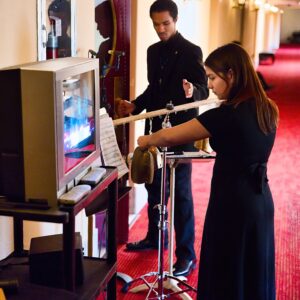
Now in its 12th season, the BPYO is a tuition-free, highly selective orchestra that includes high school and college students ages 12–21. “The goal of the orchestra is ‘shaping future leaders through music,’” Gonzalez-Gulick says. “I feel lucky to be surrounded by students in college who act as mentors and are pursuing what I want to pursue.”
Ethan Ding ’25, Tristan Price ’26 and Martin Yau ’26 are also members of the youth orchestra, which will perform works by Debussy, Walton and Rachmaninoff in another live concert at Symphony Hall in May. In June, the orchestra will tour Mexico, performing in León, Veracruz, Puebla and Mexico City.
STEM
VERTEX Heads to World Robotics Championship
Exeter’s Robotics Club’s team VERTEX started strong at the FIRST (For Inspiration and Recognition of Science and Technology) Tech Challenge New Hampshire Championship. The team posted an undefeated record in the qualification rounds during the February event in Concord. But a loss in the first elimination match put VERTEX under pressure to survive among 28 other teams in contention.
“I could see the looks of stress on their faces,” says VERTEX Outreach team member Jade Yoo ’27. “But they all worked very well under pressure” to fix the robot for the next round of competition.
Thanks to their adjustments — and a skillful alliance with Team Tesseract of Nashua, New Hampshire — VERTEX rebounded. The team won its next three matches and captured victory in the finals as captain of the winning alliance, along with a spot at the 2025 FIRST Championship, considered the world championship, in Houston in April.
Members of the other Exonian teams, EDGE, SURFACE and APEX, cheered on VERTEX at the state event, along with some Robotics Club alumni.
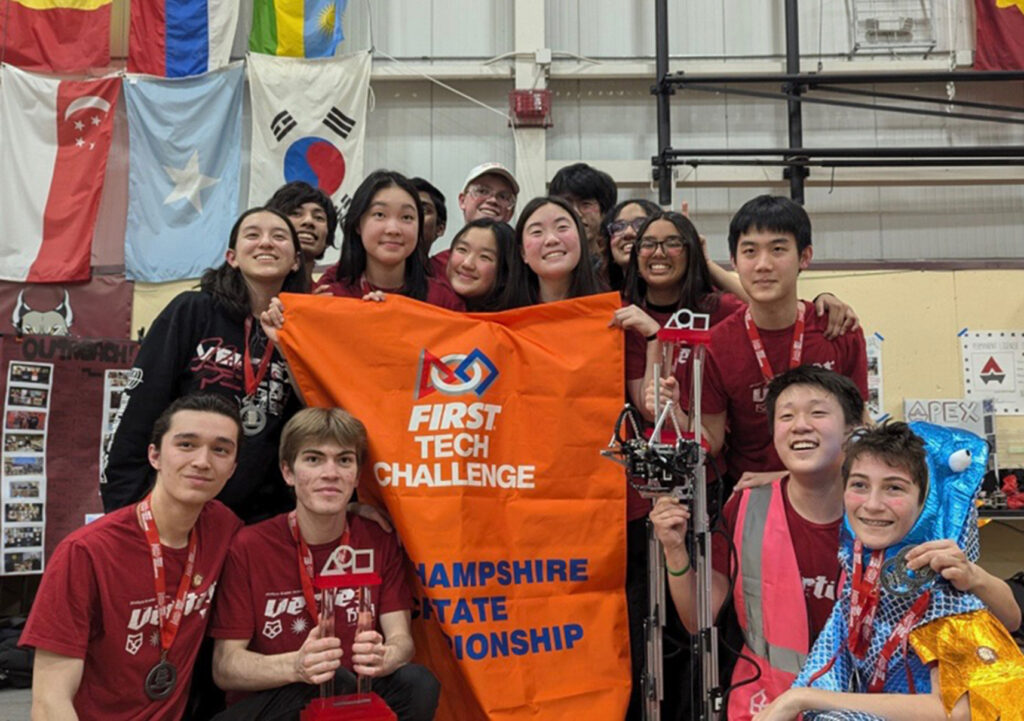
Team VERTEX, Exeter’s top Robotics Club team, placed first in the FIRST Tech Challenge New Hampshire Championship.
“How we transfer our knowledge from year to year is central to our success and is a key reason why being on the team is so fulfilling,” Teddy Duncker ’25, captain of VERTEX, told The Exonian. “It always feels like you are learning something from others.”
Beyond the programming, building and deploying of the robot, VERTEX team members like Yoo work to spread awareness of robotics and STEM by building a broad community including middle school students and government officials. At the state competition, the Outreach team took on the additional task of scouting the other teams and choosing an alliance partner — an effort Yoo says paid off big this year.
VERTEX also took home the Inspire Award, the highest team honor given at the event. The award combines robot performance with community service and work to spread awareness, a key part of the mission of the FTC organization.
After a win in New Hampshire, Yoo and her VERTEX teammates are preparing for the next level of competition. “We see what went wrong and change it to make the robot better,” Yoo says. “We can’t afford many mistakes in Worlds.”
Science
Exonian Recognized by Regeneron Science Talent Search
Last summer, Davido Zhang ’25 spent six weeks at the Research Science Institute, an intensive program at the Massachusetts Institute of Technology for 100 of the world’s most accomplished high school science, math and engineering students. He began researching optimal transport, the mathematical concept that involves determining how to most efficiently move things from one place to another. As Zhang explains it, his project considered not only the transport of material resources — how companies like Amazon might optimize their shipping routes — but also data, in situations like training artificial intelligence models.
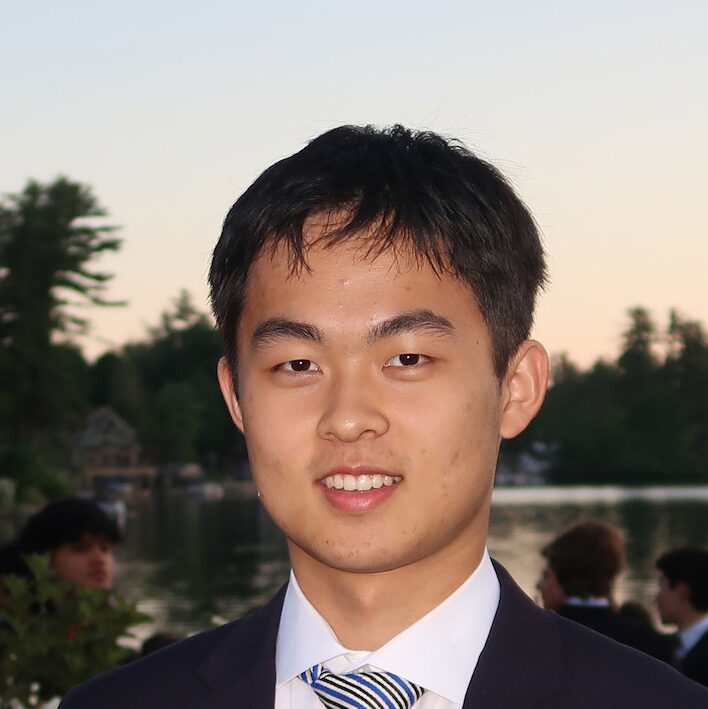
Zhang continued his research during the school year at Exeter, under the direction of his mentor in the MIT program. The resulting project, “Lipschitz Optimal Transport Maps,” earned him a $2,000 prize as one of 300 finalists — out of nearly 2,000 entrants — in the 2025 Regeneron Science Talent Search. Exonians have made impressive showings recently in that prestigious national competition: Achyuta Rajaram ’24 captured the $250,000 first prize last year, and Alan Bu ’24 and Riya Tyagi ’24 made the top 40.
“Perhaps one day in real life you’ll see an algorithm related to this math,” Zhang says of his research into optimal transport. “The idea is that the real solution is really complicated, and you’ve got to spend days with a computer just to find [it]. But there are ways to use significantly less time to find a solution that’s good enough, and that’s what I was working on.”
Math
Math Mastery on the International Stage
By the time Oron Wang ’27 showed up to compete for the United States in the 16th Romanian Master of Mathematics, he had been preparing for nearly a year. The lengthy selection process for the global contest began with a series of invitational competitions and continued with the Mathematical Olympiad Program, an intensive summer training camp in Pittsburgh. “The preparation process is kind of constant,” Wang says. “You’re always just slowly improving.”
Finally, Wang and five compatriots headed to Bucharest in February, where they tackled two complex problem sets (six total problems) demonstrating sophisticated mathematical reasoning and proof techniques. After two intense days, the U.S. team captured third place among 16 teams. Wang won a silver medal, earning an individual ranking of 19 out of some 85 competitors
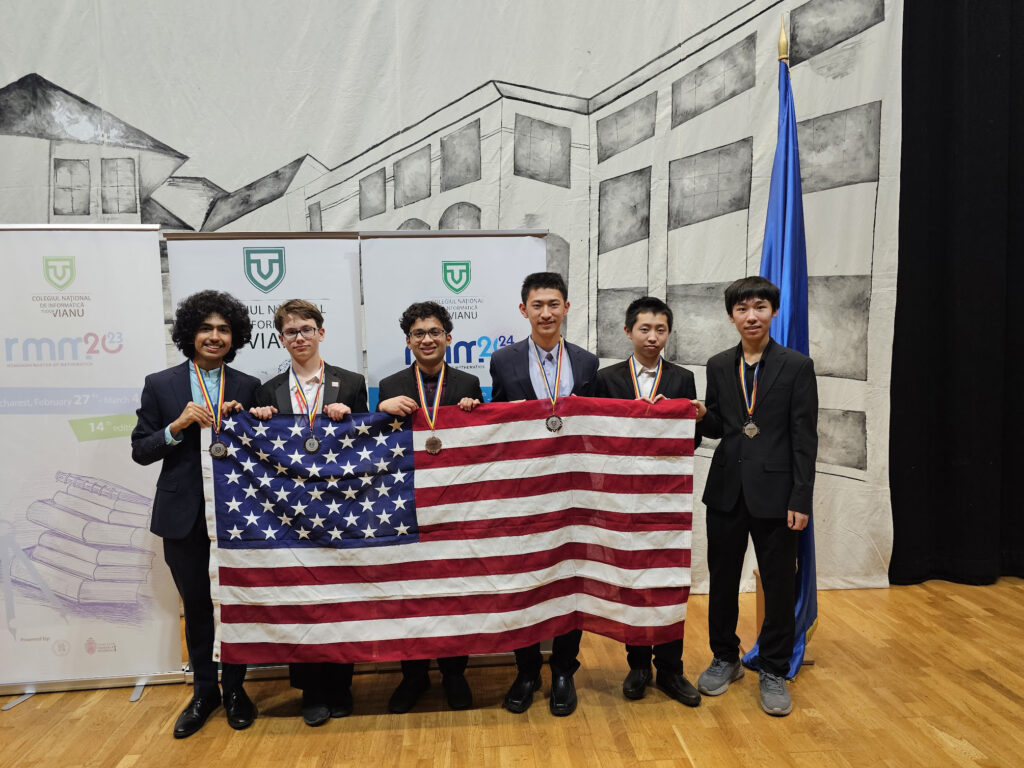
Oron Wang ’27 (far right) and the U.S. team at the 16th Romanian Master of Mathematics event in Bucharest.
He also met students from 19 other countries and spent time with his teammates from across the United States.
“The most fun part was getting to see the city,” Wang says. “We only had about a day of free time. But the six of us walked around Bucharest and found this cool museum, the Museum of Communism, which had all the details about life under communist rule in Romania. We all enjoyed it.”
History
Senior Publishes History Paper in The Concord Review
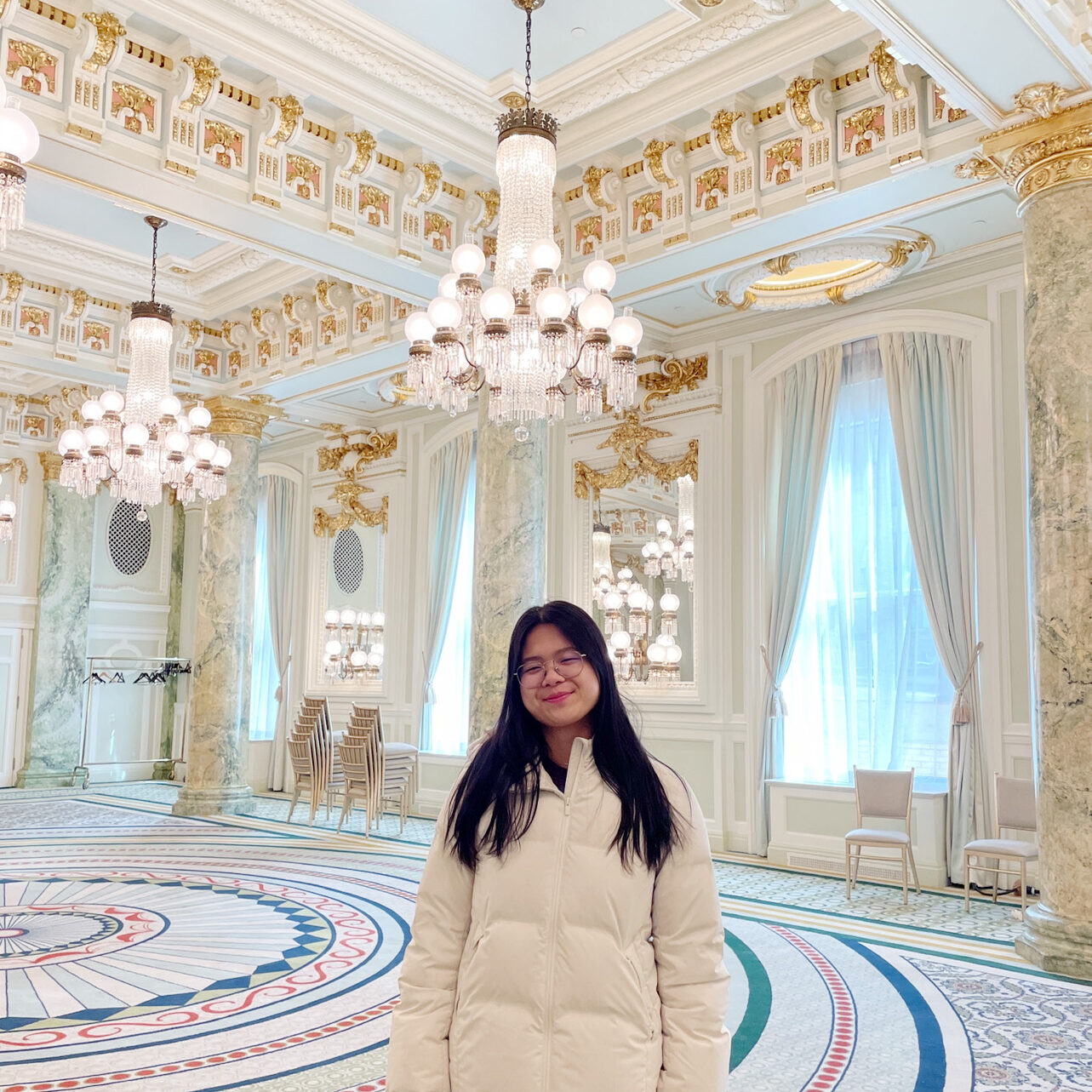
Following an early interest in child welfare, Amy Lin ’25 began researching the origins of America’s foster care system last year as part of Exeter’s U.S. history course sequence. She focused her “333” — the capstone term paper assigned in the spring term History 430 course — on the orphan train movement, a welfare program that transported children from Eastern cities to rural Midwest foster homes from the mid-19th century through the 1920s.
“I’ve always been interested in things related to children, and in writing and literature, and I carried that into the U.S. history requirement,” Lin says. “I learned a lot about structure, how to write a history paper, as well as how to do research and how to utilize the library.”
Lin worked over the summer and the school year to expand her research into a longer project, mining the wealth of electronic resources available through the Class of 1945 Library. The result was “The Origins of the Foster Care System: The Evolution of the Child Welfare System, 1850–1950,” a work that appears in the spring 2025 issue of The Concord Review, the nation’s leading publication for high school students doing research in history and social sciences.
— Adam Loyd and Sarah Pruitt ’95 are staff writers for The Exeter Bulletin.
This article was originally published in the spring 2025 issue of The Exeter Bulletin.